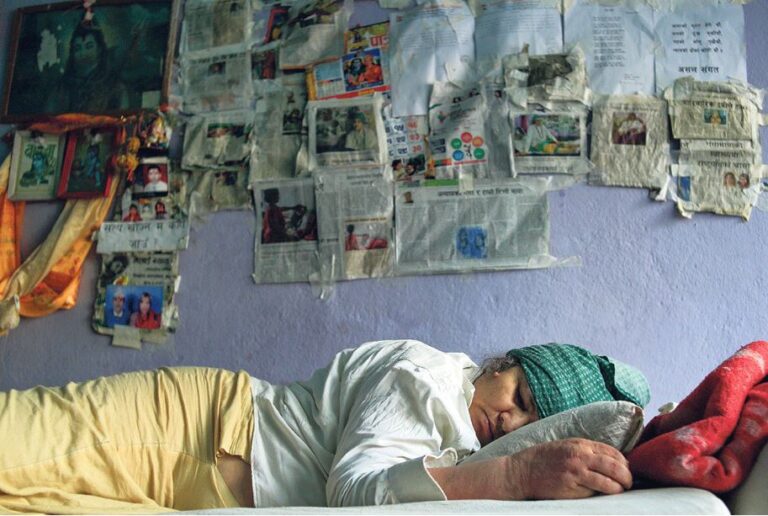
Government representatives met with Gangamaya Adhikari, who has been staging a fast-unto-death for more than one month now demanding justice for her son, on Wednesday and asked her to withdraw he strike.
Secretary at the Ministry of Home Affairs Maheshwar Neupane, Secretary at the Ministry of Law Rishi Rajbhandari, Inspector General of Police Shailesh Thapa Chettri and Chief District Officer of Kathmandu Kali Prasad Parajuli called on Adhikari to break her fast.
Adhikari has been staging a hunger strike since December 21, 2020 demanding justice for her son and is currently undergoing treatment in the emergency room of the Trauma Center. Her health condition is deteriorating by the day.
He son, Krishna Prasad was killed by the then Maoist rebels in Chitwan in June, 2004.
Ganga Maya and her late husband Nanda Prasad Adhikari, residents of Gorkha district, started a hunger strike as part of their Satyagraha since January 2013, demanding justice after the murder of their youngest son 16-year-old Krishna Prasad during the Maoist insurgency.
On 22 September 2014, the 334th day of the couple’s hunger strike, Nanda Prasad died.
Though Ganga Maya continued her Satyagraha even after her husband’s death, the hunger strike was postponed on the 359th day when the government promised to fulfill its commitment to address Ganga Maya’s demand for justice and pledged to look after her throughout her life.
Six years since the government’s pledge to justice, the promise has yet to materialise and Ganga Maya has staged fast-unto-death on several occasions at the Bir Hospital premises.
Responding to the request of the government authorities, Ganga Maya said she would not end her strike until justice was ensured. She said the government had cheated her with false assurances of justice enough times and that she did not believe them.
Meanwhile, while Ganga Maya and thousands of other decade-long armed conflict victims like her await justice promised by the government, and amid an outcry from international human rights organizations calling on Nepal Government to act swiftly towards the same, the government yesterday formed a committee to submit a proposal to ‘ensure honor and identity cards’ to the families of democratic martyrs and to the families of victims of enforced disappearance.
A Cabinet meeting held on Sunday formed the committee comprising Minister for Drinking Water Manichandra Thapa and Minister for Land Management, Cooperatives and Poverty Alleviation Shiva Maya Tumbahangphe under the coordination of Foreign Minister Pradip Kumar Gyawali.
The Committee has been tasked with collecting the records of the families of the martyrs, families of the disappeared, democracy fighters, conflict victims, victims of enforced disappearance, and persons who suffered disabilities or injuries or died during all the people’s movements and armed struggles.
The Committee should submit its proposal in the next meeting of the Council of Ministers.
Nepal faced a protracted internal armed conflict from 1996 to 2006. In the decade-long conflict, serious human rights violations and abuses were committed by both sides: the Government, including the Royal Nepal Army; and the former Communist Party of Nepal (Maoist).
Approximately 1,300 people were “disappeared” during the conflict, their fate yet to be known.
The Comprehensive Peace Agreement (CPA) put an end to the conflict on 21 November 2006, with both sides agreeing to hold perpetrators of human rights violations and abuses accountable and provide access to effective remedies and reparation to victims, including a commitment to publicize the fate or whereabouts of “disappeared”.
However, nearly 13 years after the signing of the Comprehensive Peace Agreement in November 2006, these promises remain unfulfilled.





